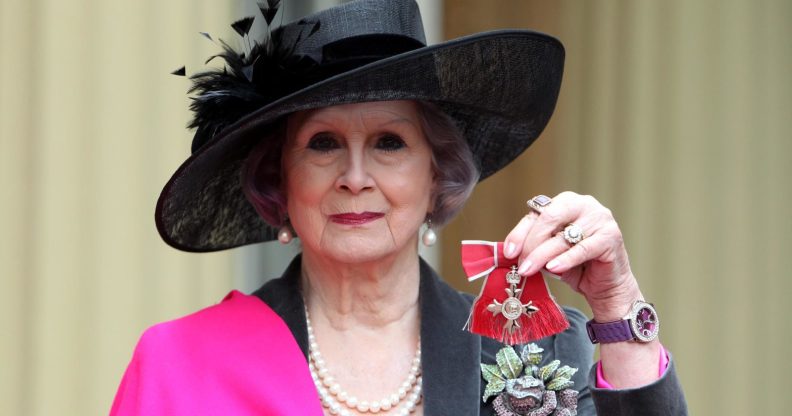The Oldie gives women’s award to pioneering trans woman April Ashley

LONDON, UNITED KINGDOM – DECEMBER 13: April Ashley holds her Member of the British Empire (MBE) medal which was awarded to her by Queen Elizabeth II during an Investiture ceremony at Buckingham Palace on December 13, 2012 in London, England. (Photo by Sean Dempsey – WPA Pool/Getty Images)
The Oldie has celebrated the moving cultural shift towards embracing transgender rights by celebrating a pioneering transgender activist in this year’s awards.
The magazine, which was created to speak to an older readership, awarded the Oldie Woman award to 82-year-old April Ashley.
Ashley, who spent over 50 years campaigning to raise awareness for transgender equality, was awarded the Oldie Woman Ahead of her Time accolade by the magazine, making her the first transgender recipient.
As one of the first British people to undergo reassignment surgery in 1960 the age of 25, having saved £3,000, Ashley had a seven-hour-long sex reassignment surgery in May 1960, performed in Casablanca, Morocco.
Yet in spite of her trailblazing efforts to bring transgender rights to the foreground, Ashley suffered many setbacks and discrimination after she was outed as a transgender woman.
However, Ashley has enjoyed a successful modelling career, as well as writing a groundbreaking autobiography about her journey, The First Lady.
The ceremony, which was attended by the likes of Judi Dench, Strictly Come Dancing’s Len Goodman and Jilly Cooper, heralded a day of celebrations.
The judges, which included Rachel Johnson, Roger Lewis, Maureen Lipman and Craig Brown, selected a host of other celebrity lifetime achievers.
Other award-winners included Oldie of the Year Dame Vera Lynn (100), Oldie Political Legend of the Year Shirley Williams (87) and Oldie Drama King of the Year Alan Ayckbourn (78).
My Dear Oldie Thing of the Year was awarded to Henry Blofeld (78), the Palmer d’Or Oldie of the Year to Geoffrey Palmer (90), and the Oldie 21st Century Fox of the Year goes to Basil Brush – whose age remains undisclosed.
Ashley was appointed Member of the Order of the British Empire (MBE) in the 2012 Birthday Honours for services to transgender equality.
She also fought for the right to be classified as a transgender woman during her divorce from Arthur Corbett in 1969, who brought the case under the premise that Ashley was a man despite her change of gender.
The case was used to deny the gender reassignment of transgender people until the Gender Recognition Act in 2004.

